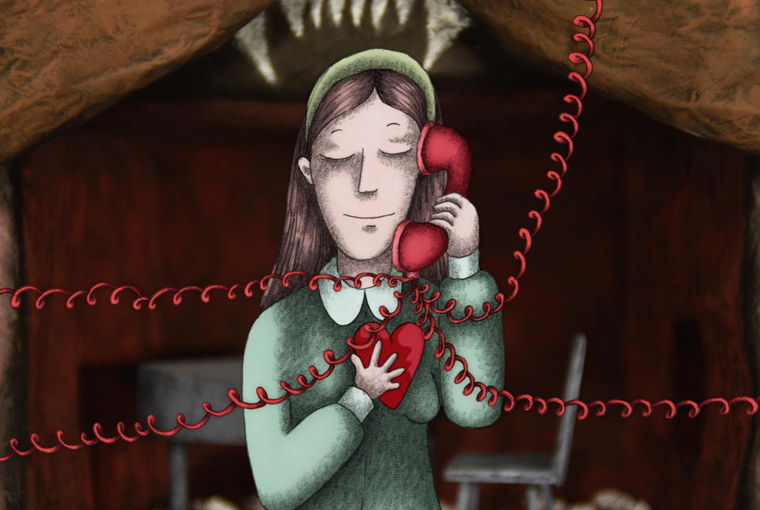
In her second feature animation, My Love Affair with Marriage, Signe Baumane uses her trademark combination of frankness and surrealism to question the holiness of holy matrimony. Centering on the feisty but perpetually bewildered Zelma (voiced by Dagmara Dominczyk), it follows her from her conception in the Soviet Union to adulthood in independent Latvia as she learns to stand her ground among the pitfalls of love, sex, and gender.
In a playful combination of narrative approaches, Zelma is pulled in different directions by two distinct forces, like a devil and an angel on her shoulder – or perhaps more like two competing devils – namely “societal pressures”, as embodied by a chorus of winged harpy women, who literally sing her into docile conformity, and “biological pressures”, as described in detail by the narrator, a talking nerve cell (Michele Pawk, credited simply as “Biology”). The external influences conspire to convince her that marriage is her one true calling in life and should be the end goal of her endeavors. At the same time, the chemicals working within her, such as oxytocin, cause her to feel overwhelming bonds of attachment and addiction to love, even when her (first) husband abuses his position as spouse to bully her into a life of submission and servitude. How are we ever supposed to form a fulfilling romantic relationship when even our own brains are pushing us to go against our own self-interest?
As inferable from the title, the film essentially depicts marriage as a trap laid by the patriarchy, with the promise of love as the bait that lures us in. That isn’t to say it denounces love as a whole, however, just the institutionalization thereof. Especially when discussing the Soviet context, it draws parallels between the bureaucracy involved in all of life’s milestones, with funerals and weddings taking place in the same austere office, both to the soundtrack of the Soviet national anthem. The parting words by the minister warn the newlyweds that the whole country is looking to them to uphold the nation and should not be disappointed. As Zelma notes, 250 million people scrutinizing your love is a lot of pressure.
It also presents female sexuality with the same mixture of deadpan vulgarity and unapologetic joy found in Baumane’s Teat Beat of Sex series of shorts. In many ways, My Love Affair With Marriage is a more mature and nuanced, if less shocking and funny, elaboration of Teat Beat. In particular, there are strong parallels with the episode in which the narrator goes to a party to resist the temptations of masturbation, only to end up marrying a guy she meets there and enter into an unhappy relationship, the moral of the story being that, contrary to what she had been told, masturbation is actually an effective means of avoiding “trouble”, such as marriage. Although neither is explicitly autobiographical, unlike the director’s first feature Rocks in My Pockets, it’s tempting to image them as based on the same story.
In this more extended analysis, the conclusion drawn is that the fundamental problems of hetero-normativity in romantic relationships are essentially caused by the problems of gender normativity in social relationships as a whole. While the problems of Zelma’s first marriage can be attributed to outdated conventions of a society on the brink of collapse (in this case the Soviet Union, although the exact same dynamics can still be found in the West), her second attempt with Bo (Matthew Modine), a suitably blond and seemingly progressive Scandinavian, also quickly falls apart. They both come to realize that they have been using the marriage as a means of shoehorning themselves into the roles they have been brainwashed into thinking they should be playing, but neither of them can ever be happy until they are true to themselves. For both of them, this means rejecting gender stereotypes – Zelma by embracing the inner wild animal of her childhood, which was shamed into latency by the conformism of standardized education, Bo by accepting his need to present himself as female in public.
My Love Affair With Marriage is a rare and much needed example of a love story with a happy end in which the happy end itself is not predicated on entering into a relationship but rather of the protagonist finding self-actualization and fulfillment. The idea that we are incomplete without a life partner still has a huge hold on the collective imagination, but it’s only logical that if a life partner makes us unhappy, we would be better off alone. In any case, there is nothing to suggest that after the credits Zelma won’t go on to find love, but equally there is nothing to suggest that love need necessarily be bound by the legal confines of matrimony, nor those of monogamy. When Zelma draws on her strength she becomes a cat, but when she feels affection she turns into a seal, and may we all find space in our lives for both creatures.




Leave a Comment